According to “director” Denis Villeneuve, in the year 2049 women will still be objectified as nubile, pliant toys for men. And men will still wonder why life has no meaning. An old trope—AIs searching for their own identity and searching for a way to become more human than human—is sold out by this lukewarm attempt. Let’s be clear, there are only a few great myths. Stories that can be told over and over again, as long as fresh meaning, insight, or at least enjoyment is injected into them. The minute a corporate committee in search of ticket sales gets a hold of a great narrative, it can be killed before it ever comes to life. Warning: if you loved the original Blade Runner, do not destroy the power of its memory by seeing this castrato of a sequel.
My response to the current dystopic sci-fi flick Blade Runner 2049—which poses as a “sequel” without advancing much beyond the director’s ego—is: “what were they thinking?” Other than the astonishing landscapes of ruined industrial cities and a few tricks of the holographic trade, BR 2049 offers little in the way of breathtaking imagery and nothing in the way of characters, narrative, or freshness. How could so much advance hype add up to so little payoff I wondered as I contemplated walking out after two hours—with another 45 minutes still to go!
Greatly to my shame, I actually stayed and watched the interminable conclusion play out like some pathetic outtake of the original Star Trek series. To understand the full extent of my indignation, let me back up and attempt to sketch out what director Villeneuve (winner of this season’s Darren Aronofsky Narcissism Award) had set out for us.
The film opens as our protagonist—a replicant (android) hunter for the LAPD named K (Ryan Gosling)—sets out to hunt down a long-lost android working a grub farm in the California of the future. Oh, in 2049 there are a new breed of replicants with indefinite lifespans, i.e. time on their hands to ponder their quiet desperation. K is one of them.
K’s airborne vehicle soars over a stunning vista of wall-to-wall industrial farms as far as the eye can see. Pale grey under a dark grey sky. He finds his prey, but he also finds the beginning of a mystery—a monumental lifeless tree, beneath which is buried a box containing skeletal remains. In search of the identity attached to those bones, K is shown through the harrowingly sterile halls of the LAPD archives by a vicious surveillance honcho played by Sylvia Hoeks. Uh-oh. K has stumbled on a mystery that the elites do NOT want known, and Hoeks’ character plants several watchers on his tail. K’s quest points to a meeting with the former blade runner, now missing for 30 years: Rick Deckard (Harrison Ford).
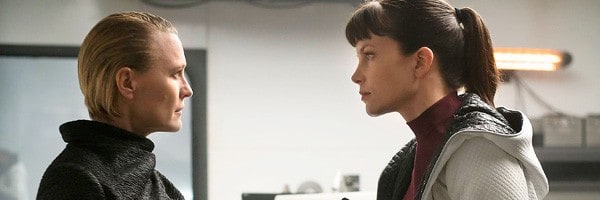
Meanwhile, his own secret investigation lead K to a brilliant scientist with unusual powers of memory, who unlocks a mystery involving a carved toy horse. (No, it doesn’t make any more sense even if you had seen the film.) Replicants, as all students of the original Ridley Scott masterpiece know, are never sure whether their “memories” are their own, or whether they’ve simply been implanted to help give them a reassuring sense of identity. [Great. An overly-long film about immortal androids with identity issues. That was old three generations ago when Carel Capek coined the word “robot” in his drama RUR.]
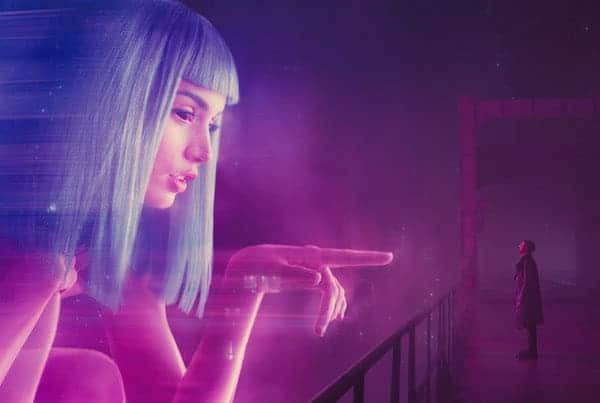 While this need to find out more about the identity of the skeletal remains pushes him into forbidden corridors, K begins to form something like a genuine attachment for his holographic girlfriend (played with cloying compassion and a gooey barbie doll smile by Ana der Armas). The third woman in his life is the always watchable Robin Wright, as a very badass LAPD boss with her own authority issues. Wright’s presence, swearing and drinking as tough as any noir cop, gives energy to every minute she’s on screen. She has a soft spot for K, allowing him time and access to areas he shouldn’t be probing, all of which is watched carefully by the diabolical, if robotic Hoeks character.
While this need to find out more about the identity of the skeletal remains pushes him into forbidden corridors, K begins to form something like a genuine attachment for his holographic girlfriend (played with cloying compassion and a gooey barbie doll smile by Ana der Armas). The third woman in his life is the always watchable Robin Wright, as a very badass LAPD boss with her own authority issues. Wright’s presence, swearing and drinking as tough as any noir cop, gives energy to every minute she’s on screen. She has a soft spot for K, allowing him time and access to areas he shouldn’t be probing, all of which is watched carefully by the diabolical, if robotic Hoeks character.
Now at this point, oh say halfway through the film, a better director (armed with MUCH better screenwriters) would have set up some soul-nudging questions. Are all of these people androids? If so, do they know they are? Even if they no longer have the familiar 4 year life spans we recall from the earlier film, long life doesn’t guarantee a sense of humanity. And then there’s the potentially juicy cliché of whether some long-lost android actually did give birth—another existential nugget upon which we might have been invited to chew. I would rather have been offered a gravel crostini. More flavor and emotional traction.
See that’s the deal: Blade Runner 2049 fails on almost every front. There are no stunning techno innovations (just incessant and repetitive CGI overload) nor is there a plot filled with engaging characters (merely robotic performances by allegedly human actors). There is only the weakly-motivated hunt for Rick Deckard which doesn’t even get underway until the beginning of the film’s third hour.
Like many directors without their own story to tell (Ridley Scott had already made his film), Villeneuve began to grow restless after he had recycled all of the silicone bodies, sharp objects, atmospheric lighting, and visual quotes from the original film. He then did what any intellectually bankrupt director does—he began aggressively borrowing from other cultural sources. “Neo, you’re the One,” can practically be overheard in several Big Moments, e.g. where for no reason at all we find Jared Leto babbling Metaphysics 101 platitudes as a blind apocalyptic guru. He also likes to disembowel naked women, but that’s another story.
But wait! We enter an industrial post-nuclear wasteland which is now an orphanage where children retrofit computer parts for a Fagin in fingerless mittens and battered tweed coat. Ed Burtynsky meets Charles Dickens. Now it’s the story of Christ’s nativity, now the digital nymphet turns out to be the squeeze with a heart of gold. Suddenly it’s a holographic carnival of Vegas acts inside the Overlook Hotel in the Shining.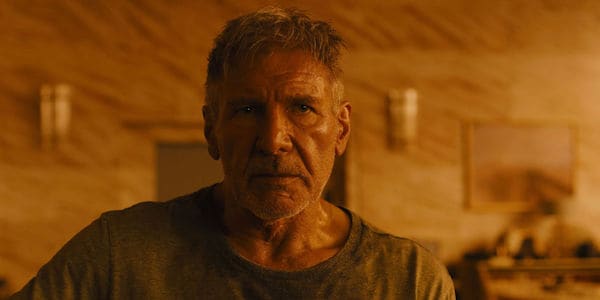
By the time the grizzled-but-ripped Harrison Ford does show up, we are out of popcorn and out of patience.
Ryan Gosling might be a likeable enough lad when tucked inside a small, independent film playing opposite a strong woman who can act, but left all alone—for hours!—in Blade Runner 2049, Gosling resorts to his one facial expression, kicks, punches, and shoots a lot of people, and does plenty of bleeding himself. Unfortunately we just don’t care very much.
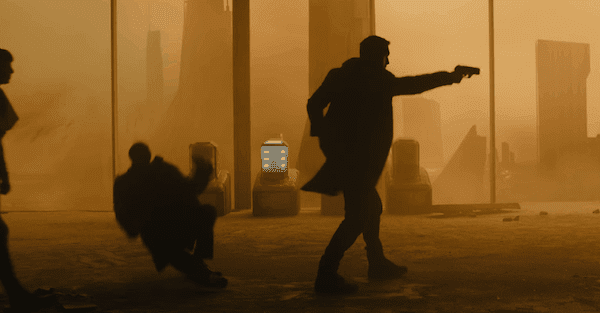
Villeneuve badly needed an editor. The film might have been able to stretch to two hours (with a better script), but it kept on going, with self-indulgent glamour shots slowing down to a crawl simply to fill up the space. Last Year at Marienbad resembles a high speed YouTube promo by comparison. Could this lethargy be due to the committee in charge consulting too many focus groups? Cinematic paralysis sets in during the film’s final half hour.
Full disclosure: My criticisms are partly the laments of someone who loved and studied the original Blade Runner. But even without that background, any filmgoer would have to ask: what’s the point?
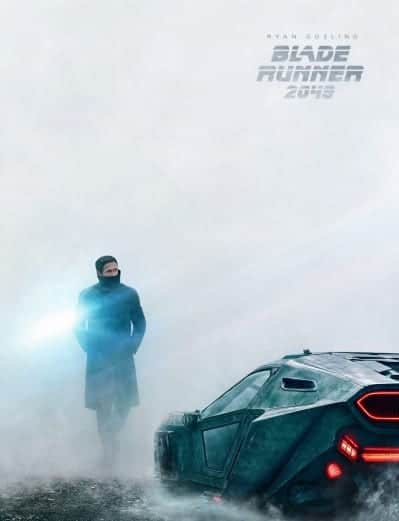 There is another way to look at this film, and that’s across the current ugliness of the mainstream Hollywood film industry itself. In this post-Harvey Weinstein era, it’s hard to stomach the blatantly coarse, cheap, and exploitive characterizations of women. Women, albeit android ones, are reduced to their bodily facades. Shots of gratuitous nudity amount to softcore without a cause. No emotional connection, simply cohabitation. Equally repellant is the amount of brutal violence—by both male and female characters—without any plot justification. How many times do we need to watch people being kicked in the face again and again? [Was this film being aimed at the “ideal” 15-year-old male audience? If so, It was aiming at an audience that wasn’t there.]
There is another way to look at this film, and that’s across the current ugliness of the mainstream Hollywood film industry itself. In this post-Harvey Weinstein era, it’s hard to stomach the blatantly coarse, cheap, and exploitive characterizations of women. Women, albeit android ones, are reduced to their bodily facades. Shots of gratuitous nudity amount to softcore without a cause. No emotional connection, simply cohabitation. Equally repellant is the amount of brutal violence—by both male and female characters—without any plot justification. How many times do we need to watch people being kicked in the face again and again? [Was this film being aimed at the “ideal” 15-year-old male audience? If so, It was aiming at an audience that wasn’t there.]
Finally—and this is the film’s fatal weakness in a nutshell—Blade Runner 2049 gives credibility to an old truism in film and television: you can tell how empty of plot, acting, or invention a film is by how punishingly loud the soundtrack. In Villeneuve’s film, wildly-amplified electronic soundscapes attempt to push us toward some sort of auditory coitus. An onslaught of high-key heavy metal sound design, with a few actors thrown in. Next week, when the film drops into to the web streaming market, watch it in your own home: with the sound off. You’ll be asleep in no time.
**********************
With Ryan Gosling, Sylvia Hoeks, Ana de Armas, and Harrison Ford. Written by Hampton Fancher and Michael Green. Directed by Denis Villeneuve. 163 minutes.

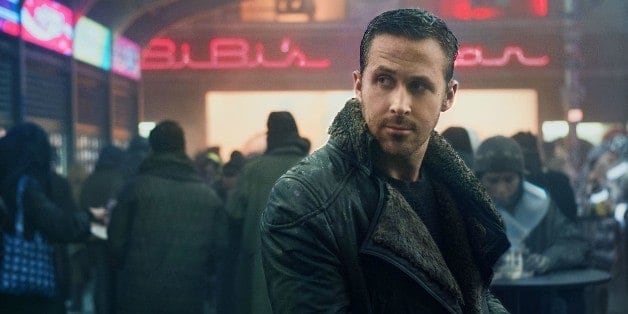

Wow that was a very long mean spirited review for someone who ran out of popcorn during the 2nd hour. Something must have caught your attention although you did not reveal anything. I get your passion for films and Blade Runner was obviously one of them. If I had read this review before I saw the film I probably would have passed on it but glad I didn’t. Ryan Gosling only got an Academy Award cuz he finally smiled in La La Land, it’s a Clint thing with him. Mostly bad casting in this film. I truly enjoy most what you have say about local art,restaurants(except Kaito on 41st terrible)and film.